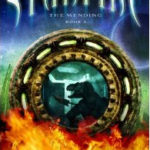Overheard At The Agora
The more things change, the more they stay the same.
 Time: 57 A.D, about three hours past dawn.
Time: 57 A.D, about three hours past dawn.
Place: A village in the countryside, a few furlongs from Rome.
Two friends meet in the marketplace…
“Good day to you, Cleopas. The Lord’s peace be with you.”
“And also with you. Good day, Lucius. I must confess my heart is heavy, despite the beauty of this morning.”
“Truly? What ails you, my brother?”
“Gaius.”
“Ah, the melancholy lad. My Phillipa speaks often of him. They should spend more time together. It might cheer him up.”
“He’s been writing.”
“Wonderful! The opportunities for a literate young man these days are unlimited. There’s always a demand for scribes, and accountants, and personal secretaries. I heard just this morning the University is seeking new apprentices for their resident historian. The crotchety old fellow wants to retire to his villa in Mykonos, and…”
“Lucius, he’s writing poetry. Stories.”
“Hmm. Less of a market there. Still, it’s a noble pursuit. Think of Homer, Ovid, and Aristophanes. With patience and dedication, he could well achieve excellence.”
“You don’t understand. His stories are…different. He calls them ‘speculations.’ Outlandish tales of life in the future.”
“Unusual. Perhaps the novelty will help sell his work.”
“They’re insane. He writes of chariots propelled by their own motive force. Flying machines. Ships that travel under the water.”
“Youthful fancies. I’m sure he’ll outgrow them and adopt more mature themes, in time.”
“That’s not the worst of it. He speaks of life on Earth thousands of years from now! The Empire crumbled into dust! Kingless nations ruled in the Greek fashion, by vote of the people! The Church in anarchy, split into hundreds of warring sects! I fear these are the ravings of a revolutionary and a heretic.”
“Cleopas, neither of us would shed many tears over the Empire, and we recognize no true king but Christ Himself, so structures of government hold little concern for us. But…thousands of years passed without our Lord’s return? Disunity in the Church? It diverges from what we’ve been taught.”
“Exactly. Revolutionary sentiments bring trouble, but that’s sure to come in any event. Persecution of the faithful is already rampant. I fear for his soul. Perhaps his faith is not so grounded as I’d thought. There are some in our fellowship who might seek his expulsion if they discovered this.”
“Wait. These are works of idle imagination, not political speeches or letters of doctrine with the intent to teach. And…maybe his ideas aren’t so outlandish as they appear at first glance.”
“What do you mean?”
“Remember at the beginning, when so many gathered festively in the countryside to await our Lord’s return? They had disposed of their possessions and resigned from their employment, certain that only a few days remained until the Heavenly Kingdom was established on Earth. Paul the Apostle chastened them for idleness, and Peter reminded us all that God does not count the hours as we do. Who knows how long He may tarry that more may be gathered to Him?”
“I suppose that’s true. We are called to follow Christ with all our strength, regardless of the delay. Still…thousands of years…such a trial of faith is difficult to imagine.”
“And what of his stories’ heroes? What are they like?”
“Oh, men of strong character, to be sure. Kind and merciful, brave and self-sacrificing. They seek justice for the oppressed. Not perfect, but willing to admit their faults and redress their errors. However, some are women, and are disconcertingly powerful, even holding positions of high authority in government.”
“But those women are also of noble character?”
“Yes. Virtuous and thoroughly admirable.”
“These are all qualities we are enjoined as Christians to pursue in our own lives. What fear is there in such worthy models, even when found in bizarre circumstances? Perhaps the very strangeness of their environment may serve to make the reader wonder at the good works portrayed, and what might motivate them.”
“You are a good friend, Lucius, to encourage me so. It may be that my son has not wandered so far afield as I had feared.”
“And you are a good father to hold such concern for his spiritual welfare. Who knows? His inspiration may come from heaven. Gaius, son of Cleopas, may one day be numbered among the prophets.”
“Ha! If he would be more prompt about his chores, that would be a miracle indeed!”
————————————–
I’d like to thank Stephen, Becky, and the rest of the crew at Speculative Faith for inviting me to be a regular contributor. I’ve admired their work for some time now, and have enjoyed this forum where the tough issues of faith and fiction are always debated thoughtfully and respectfully. I just hope I can keep up with the serious brainpower going on here.
I’m hoping to bring something a little different on Tuesdays—the odd, the offbeat, the weird angle that makes you think a bit after it makes you smile. If I’m missing the mark, let me know—this is all about you, the faithful readers, and I want to do my best for you.
Fred










































~needs a friend like Lucius~
Welcome, Fred Warren. I look forward to your posts!
Hi, Esther! Thanks for the welcome.
Fred
Hi Fred!
This one was right on the mark! Thanks for that uplifting story.:)
“If I’m missing the mark, let me know—”
You can count on it. =)
Thanks for the story. It makes me proud to be Italian.
Welcome to the blog.
Wonderful post Fred. I look forward to reading more. You’re a funny fellow. 🙂 And thoughtful. Great combination.
Fred, it’s so great to have you. I’ve been thinking perhaps we needed some more fiction-with-a-point on the site — especially the grounded-in-history-but-speculative kind with just a hint of irony!
Love the sympathy Cleopas engenders with a reader. He’s not some hostile legalist or a heretic himself; he just wrongly and automatically equates “[divergent with] what we’ve been taught” (as Lucas phrases it next) with heresy. But heresy in this case means “divergent with the true Gospel.” Different views on end-times or even Art and All That are not heresy (and I fear the word in real life gets thrown around too often).
That’s one thing both doctrine discussions and visionary fiction — or any kind of good fiction) can do — just make us double-check our beliefs, to see if what we’ve been taught is actually based in the Bible. And I believe a visionary novel could help readers imagine even more in-depth whether the Christian worldview could hold up under the most pressing of circumstances: not simply Unrequited Love or Historical Unrest but harsher circumstances, such as, oh, secular-humanist space exploration wowing the world of the future, or being taken to a created-land where actual magic is actually real. …
By the way, just last September I saw one of the novels nominated for the ACFW Carol Award for best visionary fiction: an odd-looking cover, featuring a guy with wild hair. That novel is The Muse, published by Splashdown Books, and now after reading your column here I want to go find that book and sample more of your fiction.
I loved it!
Thanks again to everyone for the warm welcome. In pondering what I might contribute this week, I thought about the ongoing debates on Christian writing blogs, including this one, about the nature, purpose, and limits of Christian fiction, particularly speculative fiction. Rather than roll in on that discussion in a conventional way, I began to wonder what this debate might have sounded like a long time ago. It turned into a spec-fic story of sorts, which felt a little strange, since I usually think of speculative fiction as looking forward in time, rather than backward.
I hereby call dibs on an entire new subgenre: early-Church first-century Roman-empire steampunk.
A Clockwork Crucifix?
If I’m missing the mark, let me know—this is all about you, the faithful readers, and I want to do my best for you.
Wait — there’s a mark? I was told of no such mark! Stephen, why does Fred get a mark and not me? 0=)
I’m hoping to bring something a little different on Tuesdays—the odd, the offbeat, the weird angle that makes you think a bit after it makes you smile.
Melikes. 0=)
First, between this segment and your wonderful review of The Charlatan’s Boy, I second Stephen’s response: I have GOT to read The Muse.
Second …
I seriously burst out laughing reading this title, and I definitely want to read it now. Kaci, you simply have to invent this genre now.